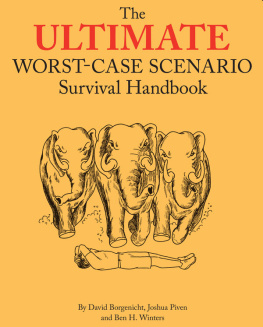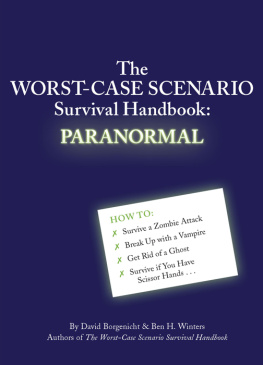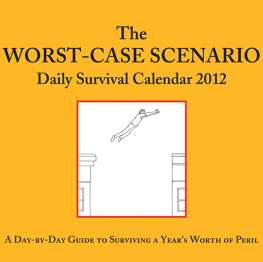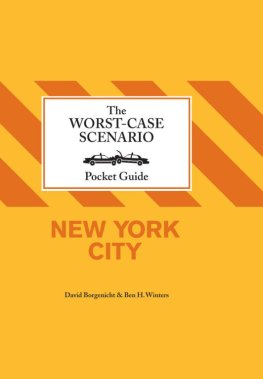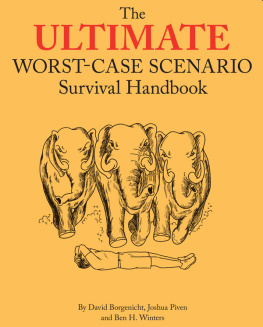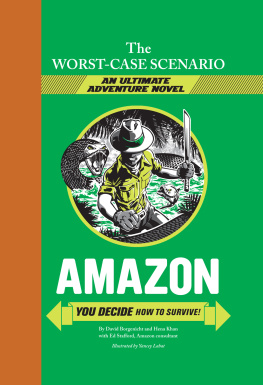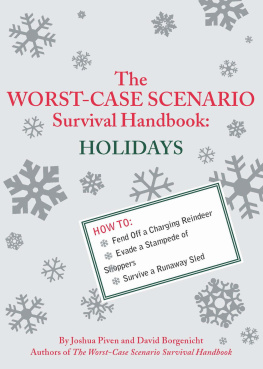
When a life is imperiled or a dire situation is at hand, safe alternatives may not exist. To deal with the worst-case scenarios presented in this book, we highly recommendinsist, actuallythat the best course of action is to consult a professionally trained expert. But because highly trained professionals may not always be available when the safety or sanity of individuals is at risk, we have asked experts on various subjects to describe the techniques they might employ in these emergency situations. THE AUTHORS, PUBLISHER, AND EXPERTS DISCLAIM ANY LIABILITY from any injury that may result from the use, proper or improper, of the information contained in this book. We do not guarantee that the information contained herein is complete, safe, or accurate for your situation, nor should it be considered a substitute for your good judgment and common sense. And finally, nothing in this book should be construed or interpreted to infringe on the rights of other persons or to violate criminal statutes; we urge you to obey all laws and respect all rights, including property rights, of others.
The Authors
First ask yourself:
What is the worst that can happen?
Dale Carnegie
Failure to prepare is preparing to fail.
John Wooden
Be brave. Take risks.
Paul Coelho
Its been more than a dozen years since the first volume of The Worst-Case Scenario Survival Handbook was published in 1999. Weve sold over 9 million copies worldwide of these handy little life, limb, and sanity-saving guides. Weve sold millions more instructional board and video games, and been involved in the creation of two different television series based on our books. Suffice to say, weve taught a lot of folks how to survive some of the worst life holds in store.
And now we have some good news, and some bad news.
Heres the bad news: The world is more dangerous than ever.
From hurricanes to civil unrest, from global warming to shark attacks, from severed limbs to yoga injuries, it seems as if danger lurks around every corner, beneath every surface, behind every Web page. And the fact that weve provided millions of people clear, step-by-step instructions for dealing with lifes sudden turns for the worse doesnt seem to have decelerated things. If anything, the speed at which life moves these days, thanks to modern technology, has made things even more dangerous.
We still dont know whats coming our way, and its heading toward us even faster than ever.
Still, heres the good news: the keys to surviving any of lifes sudden turns for the worse are the same as alwaysBe Prepared. Dont Panic. Have a Plan.
And thats exactly what The Ultimate Worst-Case Scenario Survival Handbook aims to give youtools to use and remember. (In addition to the clearest instructions available for surviving everything from jellyfish and zombies to honeymoons and brake failures.)
Be Prepared. This means thinking through what youll need to do, take, and learn prior to any adventure or journey you set off on. Heading off into the mountains alone? Be sure to let your friends and family know where youre going and when youll return, and to take the right equipment and supplies. Heading out for a blind date? Be sure you have an escape plan if it turns out to be a disaster. Heading out on a boat trip? Make sure you know how to make an emergency floatation device out of your pants. Youre already tilting the odds in your favor.
Dont Panic. This means just what it saysdont freak out when something happens, expected or unexpected. Panicking means youll be breathing heavily, which means youll be expending unnecessary energy and not getting enough oxygen to your brain and muscles, which means youll almost certainly make a mistake, or lose strength or judgment right when you need it the most (as the rhino starts to charge, or as your Powerpoint falters during the biggest presentation of your career). Take three deep breaths (filling your abdomen first, then your chest, then exhaling fully), then act.
Have a Plan. Or, if you dont have one in advance, formulate one. And quickly. Use your common sense, your instinct, and the information within this book to plan a course of action. And then be ready with Plan B in case Plan A doesnt work.
Conveniently, this book contains not only enough Plan As for your journey through life, but also Plans B, C, D, and far down into the alphabetall from experts in the subjects at hand, as recorded by accomplished journalists and writers. The Ultimate Worst-Case Scenario Survival Handbook presents new scenarios, illustrations, charts, and the most up-to-date survival tips, and also draws on the most useful information from the full range of the series handbooks, almanacs, pocket guides, and other books.
When the time comeswhen youre faced with that act-now-and-get-it-right crisiswe want you to know what to do, and thats why weve written this book. We want you to know all the marine creatures that can kill you without using their teeth, and how you can create a signal fire on a deserted desert island. We want you to be able to find and destroy bedbugs in a hotel room, to be able to bind an alligators jaws, and to fend off an attackerwhether the attacker is using a fist, knife, chair, or golf club. And we want you to know how to sneak in late to a meeting and many, many other useful skills.
Because even after a dozen years, and after all the advice weve provided, you just never know what life will bring. And we want you to survive!
The Authors

1
Tooth and Claw
ANIMAL
ENCOUNTERS
1 If you are on land, get on the alligators back and put downward pressure on its neck.
This will force its head and jaws down.
2 Cover the alligators eyes.
This will usually make it more sedate.
3 Go for the eyes and nose.
If you are attacked, use any weapon you have, or your fist.
4 If its jaws are closed on something you want to remove (a limb), tap or punch it on the snout.
Alligators often open their mouth when tapped lightly. They may drop whatever it is they have taken hold of and back off.
5 If the alligator gets you in its jaws, you must prevent it from shaking you or from rolling overthese instinctual actions cause severe tissue damage.
Try to keep the mouth clamped shut so the alligator does not begin shaking.
6 Seek medical attention immediately, even for a small cut or bruise, to treat infection.
Alligators have a huge number of pathogens in their mouths.

To get an alligator to release something it has in its mouth, tap it on the snout.
An alligator more than nine feet long is likely to be male, and males tend to be more aggressive.
Bill Finger, professional alligator breeder

The immediate danger zone is within 15 feet of the alligator.
1 Determine the size of the alligator.
Although even small alligators can cause injury, those less than four feet long are not as dangerous to humans. If the alligator is larger than six feet, be especially wary, as a bite can inflict major damage. Alligators larger than nine feet should be considered deadly.

